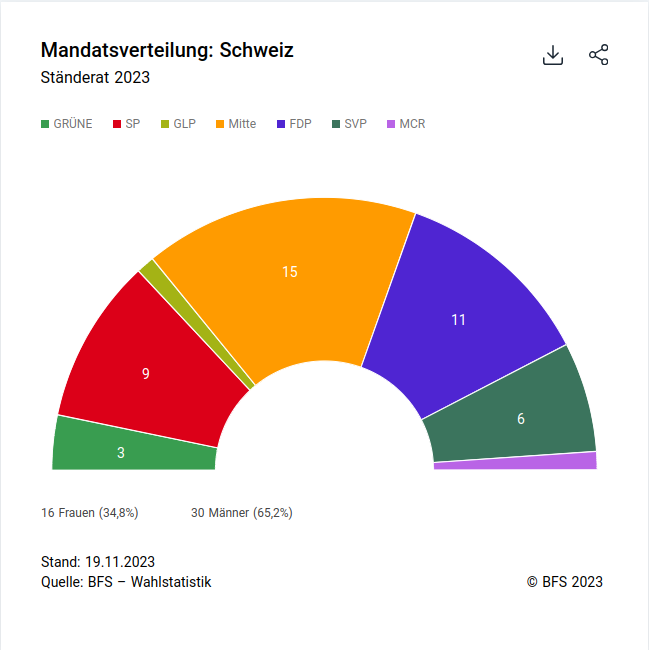lun, Nov 20th 2023
With the second rounds of voting for the Council of States in five cantons, the parliament is complete. Despite the lack of success in the Council of States elections, the SVP remains the strongest party with 68 seats, followed by the SP with 50 seats. With 44 seats, the Center Party is ahead of the FDP (39).

The Green Party still has 26 seats in the federal parliament. It lost one seat each in the Council of States in Geneva and Vaud and five in the National Council. With three seats left, the Greens lost their parliamentary group strength in the small chamber.
Meanwhile, the Green Liberal Party (GLP) lost six seats in the National Council. It now has eleven seats in the United Federal Assembly. However, it was able to re-establish itself in the Council of States on Sunday with Tiana Moser’s seat win in Zurich following the resignations of Verena Diener (ZH) and Markus Stadler (UR) in 2015.
The right-wing Mouvement citoyens genevois (MCG), which made a comeback in the National Council with two seats, is now represented with one seat in the Council of States. After Thomas Minder failed to be re-elected as a member of the Council of States, there is no longer a non-party member in parliament.
Like the Lega representative and the Federal Democratic Union (EDU) in the National Council, Minder had joined the SVP parliamentary group. The SVP is prepared to accept the three MCG representatives in the coming legislature.
Following nine gains, the SVP has 62 seats in the National Council and an unchanged six in the Council of States in the new legislature. In Zurich, its candidate Gregor Rutz, who was also recommended by the FDP, failed, as did Benjamin Giezendanner’s defense of his seat in Aargau. In Solothurn, SP candidate Franziska Roth defended her party’s seat against Christian Imark of the SVP.
In the Council of States, the FDP had to accept the loss of the Zurich seat to eleven seats – and also lost 28 seats in the National Council. The Centre Party was able to stabilize its balance in the National Council with a gain of 29 seats and cement its position in the Council of States with 15 seats with one gain each in Aargau (from the SVP) and Ticino (from the SP). It thus overtook the FDP as the third strongest party.
With the Solothurn seat defended, the SP remains at 9 seats in the Council of States, while in the National Council it gained two seats to 41 seats. The EPP lost one of its two seats in the National Council, while the EDU gained one seat and now has two seats.
Even with the FDP and smaller right-wing parties, the SVP will not be able to achieve a right-wing majority in any chamber, as was the case from 2015 to 2019. The left-green camp does not have a majority either, meaning that the strengthened center will play an even greater role in tipping the scales.
With Sunday’s second round of voting, the proportion of women in the Council of States rose to 16% after 14 in the last elections in 2019. In contrast, seven fewer women were elected to the National Council than four years ago. The proportion thus fell from 42% to 38.5% after a sharp increase in 2019.
The average age of the Council of States in the coming legislature is 55.4 years. The average member of the Council of States is a good two years younger. In 2019, the average member of the Council of States was 54.7 years old. In the National Council, the average age is 50 and for female National Councillors it is 49. In 2019, the average age in the National Council was 49.3 years.
©Keystone/SDA
